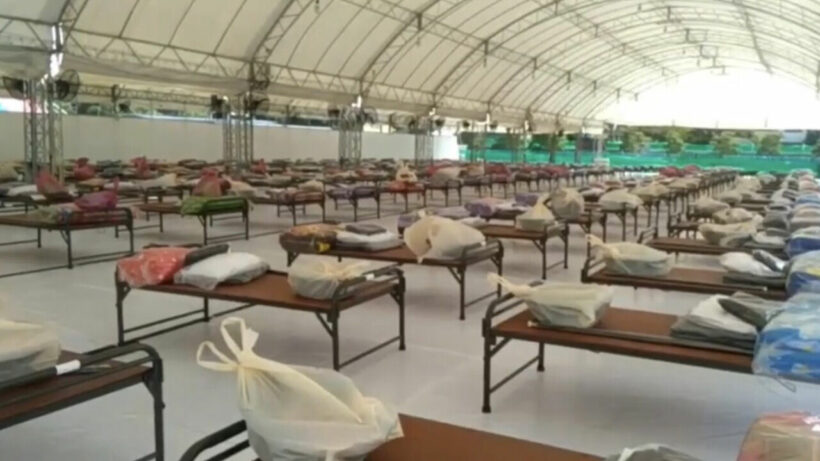A look at Thailand’s Covid-19 growing field hospitals

Field hospitals have become a necessity across Thailand as Covid-19 cases surge after the Songkran holiday and hospitals struggle to accommodate patients. 20,000 people have now been treated for the coronavirus with thousands of them being admitted to these pop-up medical facilities. And with today seeing a huge jump in Covid-19 infections, the number of people in field hospitals will definitely grow. But not all field hospitals were created equal and experiences vary widely.
The need for field hospitals began being discussed in early January when the second wave of Covid-19 hit Thailand, with provincial governors being asked to plan for what venues in their area could be converted to medical facilities if needed. But now that the third wave of Covid-19 has brought daily infections in the thousands, these overflow plans have been rolled out not just in Bangkok and Chiang Mai, but even in smaller provinces where infection surge.
When Covid-19 first broke out in Wuhan they had extensive field hospitals constructed within one week. South Korea, the United States, and Germany are with Thailand as countries that have put field hospitals into regular use in the battle against the Covid-19 pandemic.
With hospitals full and waiting lists growing, field hospitals provide temporary accommodation for large influxes of patience. The Medical Services Department and the Health Service Support Department oversee these quickly-constructed facilities and the beds lack partitioning but are spaced for social distance. They are typically no-frills with only basic necessities like food and water, a bed and a blanket.
These makeshift facilities are currently being used for positive Covid-19 patients who are experiencing minimal symptoms. They are built at a variety of locations like temples, stadiums, or schools. Bangkok Arena sports centre is one of the field hospitals the Bangkok Metropolitan Administration has opened. Any place that has proper ventilation and toilet facilities can be converted.
While the facilities are basic, The Centre for Covid-19 Situation Administration has stressed that they provide patients with convenience and appropriate care. Not all Covid-19 cases need full intensive care from a hospital, and these field hospitals serve as a balance between isolating and observing Covid-19 infected people and crowding hospitals with patients that don’t need the advanced facilities.
Champion bodybuilder Chaipipat Liewtrakul talked about his experience. He said things started out spacious and calm, but then new patients began to pour in. With no partition, he feared being reinfected. He also said though that he and his new hospital friends helped clean and assemble beds as the field hospitals expanded. This is a common experience, as many patients after registering and checking in are generally responsible for themselves. They check their own body temperature and blood pressure, make their own bed, and serve themselves when food arrives.
Patients report all their checkup readings to medical personnel, with some of these services being done online, and get medical attention when necessary. Field hospitals generally operate with minimal staff but always have doctors and nurses on duty. The minimum requirement is a nurse for every 20 to 40 patients and a doctor per 100 to 200 patients according to the Medical Services Department.
The National Centre for Genetic Engineering and Biotechnology also sought to assuage reluctant patients, explaining that chances of reinfection at a field hospital are low as already-infected people produce antiviral interferons that are usually sufficient in preventing reinfection.
SOURCE: Thai PBS World
Latest Thailand News
Follow The Thaiger on Google News:


























